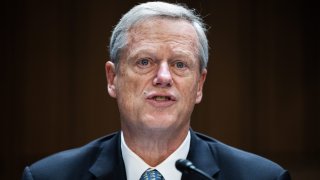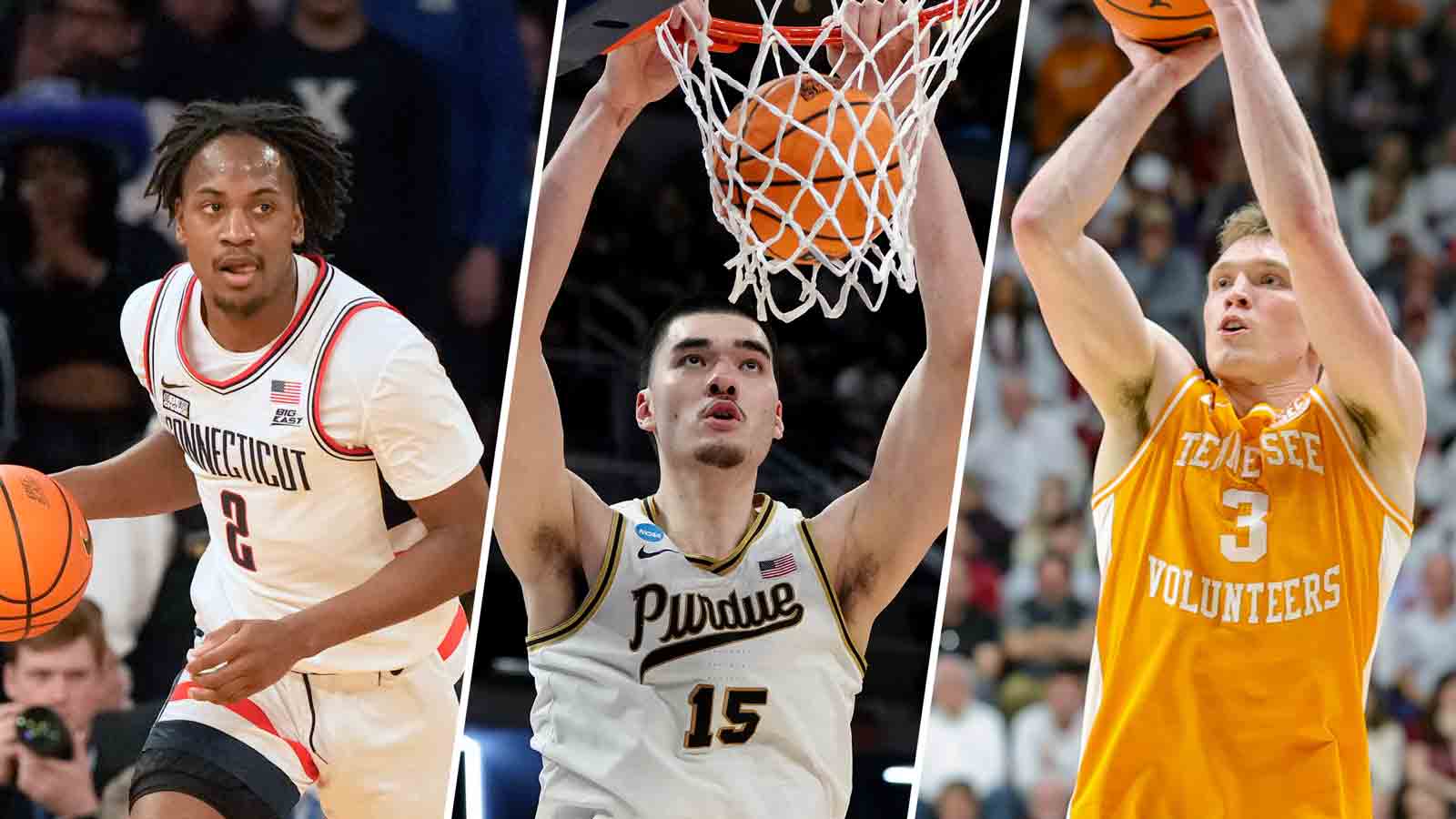
In the midst of March Madness, the NCAA is pushing for states with legal wagering on sporting events to ban prop bets on college athletes.
“Sports betting issues are on the rise across the country with prop bets continuing to threaten the integrity of competition and leading to student-athletes getting harassed,” NCAA President Charlie Baker said Wednesday in statement posted on social media. "The NCAA has been working with states to deal with these threats and many are responding by banning college prop bets.”
Prop bets — short for proposition bets — allow gamblers to wager on statistics a player will accumulate during a game rather than the final score.
Baker's statement came two days after the NBA confirmed it opened an investigation into unusual betting patterns surrounding props involving Toronto Raptors forward Jontay Porter. The Raptors said Porter would miss his third consecutive game Wednesday for personal reasons.
Some NBA players and coaches have been outspoken recently about prop bets and how gamblers react when numbers fail to hit. Indiana Pacers guard Tyrese Haliburton said his social media is filled with complaints and Cleveland Cavaliers coach J.B. Bickerstaff revealed he received threats from gamblers last season and reported it to the NBA.
Earlier this month, U.S. Integrity, a company used by many professional sports leagues and college conferences to monitor betting activity, flagged a Temple regular-season men's basketball game for wagering irregularities.
The NCAA men's and women's basketball tournaments are a huge draw for gamblers. The American Gaming Association estimates $2.7 billion will be bet this year on March Madness through legal sportsbooks.
Several states including Colorado, Arizona, Massachusetts, New York, Pennsylvania and Oregon have rules prohibiting prop betting on college athletes that predate the NCAA's recent push. Others such as Illinois, Connecticut and Iowa do not allow college athlete prop bets involving in-state teams.
Kansas, Michigan, Louisiana and Wyoming allow bettors to place prop bets on college athletes regardless of where they play.
The NCAA already has made some progress this year toward eliminating prop bets on college athletes. Gambling regulators in Ohio, Vermont and Maryland have removed prop betting on college athletes online and in sportsbooks. Baker and his staff are reaching out to regulators in other states to encourage similar bans.
The Ohio Casino Control Commission said last month in granting the NCAA’s request that prop bets last year on NCAA athletes with sports gaming operators in the state brought in approximately $104.6 million, which accounted for 1.35% of the total amount wagered. Prop bets on college athletes accounted for about 2.2% of wagers.
Chris Cylke, senior vice president for government relations for the American Gaming Association, said banning legal wagering on college player propositions would drive more bettors to illegal and offshore sportsbooks.
“While it is unclear how this advances our shared goal of reducing athlete harassment, we do know that driving customers to illegal channels will ultimately hinder the ability to monitor for and detect potential suspicious betting behavior,” Cylke said in a statement provided to The Associated Press.
The number of states that now allow some form of sports betting has grown to 38, plus the District of Columbia. Thirty states and the nation’s capital allow online wagering.
Companies that monitor sports betting for irregularities have warned college sports administrators that prop betting on unpaid athletes elevates the potential risk for a scandal because players can more easily influence their own performance than the overall outcome of a game.
The NCAA conducted a survey after last year's basketball tournaments that found 58% of 18- to 22-year-olds are gambling.
Baker has said the proliferation of legal sports gambling has increased stress on college athletes.
“All that chatter about who's playing, who's not playing. Who's sore, who's not sore. What's going on with the team you're playing? What do you think your chances are? Which is just classic chatter, where — in a world where people are betting — takes on a whole new consequence,” Baker said in January before his address to membership at the NCAA convention.
The NCAA has partnered with a data science company called Signify, which also works with the NBA Players Association and WNBA, to identify online threats made to athletes during championship events that are linked to wagering.
“Basically tracks ugly, nasty stuff that’s being directed at people who are participating in their tournaments and we’d use it the same way,” Baker said in January. “And it can shut it down or basically block it. And in some cases even track back to where it came from.”
In October, the NCAA announced it would be advocating for state legislators to update laws to crack down on harassment of athletes, coaches and game officials and bolster integrity protections.
In West Virginia, NCAA officials worked with lawmakers to pass a bill that would allow betting regulators to ban people from wagering in the state online or at sportsbooks who have been found to have harassed players, coaches, or officials online or in person. The bill is awaiting a signature from Gov. Jim Justice.
San Diego State men's basketball coach Brian Dutcher said he is concerned about how all the negative feedback impacts athletes' mental health.
“People complaining about how they’re playing, missing shots, and they just get beat up constantly,” said Dutcher, whose team is playing in Boston in the Sweet 16 this week.
Illinois guard Dra Gibbs-Lawhorn said he encourages his teammates to ignore the criticism.
“I never really am on social media but in person someone would be like, ‘I’m going to bet the under on you.’ In that moment you can’t say anything,” Gibbs-Lawhorn said. "So I’m just like, ‘OK, good job.’ Like, I don’t know what you want me to say.”
AP Sports writers Tim Reynolds in Miami and Jimmy Golen and Kyle Hightower in Boston contributed to this report.




